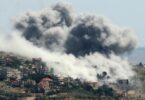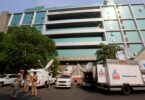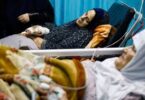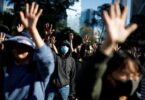JUBA (AFP): Detoh Rie has spent the last five days hiding in a swamp with his children — one among thousands of South Sudanese forced to flee their homes as renewed violence threatens to return the fragile nation to war. When clashes erupted on Friday between forces loyal to President Salva Kiir and his rival, Vice President Riek Machar, in the country’s oil-rich Unity state, Rie wasted no time in grabbing his children and running for their lives.
“The soldiers attacked our villages and burnt many of our houses. They took our cows and goats and they killed people,” the 51-year-old told AFP by telephone from Leer county. He says he doesn’t know if the rest of his family made it out alive as the attackers reduced his village Waay to smouldering ruins. South Sudan has been here before.
Barely two years into its hard-won independence, the country found itself in the grip of a civil war between Kiir and Machar that left nearly 400,000 people dead before the two men signed a peace deal in 2018. But the peace process has been hamstrung by political bickering and when fighting spiralled in recent weeks, civilians have once again been forced to pay the heaviest price.
Although Kiir and Machar announced an end to the latest hostilities earlier this month and vowed to make swift progress on implementing key provisions of the 2018 pact, Unity state was wracked by fresh violence less than a week later. According to Stephen Taker, commissioner of Leer county, the authorities registered 13,930 displaced people, with many reluctant to head home despite calm reportedly returning to the area. “Everything that they had was all looted,” he told AFP, describing the situation as “completely bad”.
Officials say the number of those displaced could be much higher, with many either unable to access help or too afraid to leave the marshes where they have sought refuge. Like Rie, Kou Tek is also sheltering in Leer’s swamplands, walking for four hours with his family to safety. The father-of-three described horrific abuses by the armed men who laid waste to his village, telling AFP that women and girls were raped.
The attackers also shot dead villagers, he said, adding that he personally saw eight corpses. Although the 39-year-old counts himself fortunate to have escaped the killing spree, he said many displaced people were struggling to survive, with no food or clean water. “Children are taking water from the rivers which are not safe. So a lot of children are having diarrhea and they are not getting any medication,” he said.
Many children and elderly people “are also dying because of hunger”, he added. The United Nations Mission in South Sudan (UNMISS) has sounded the alarm, warning of “a dire humanitarian situation” in Leer county. “Things got worse over the past weekend with numerous villages south of Leer town being looted and burnt. Critically, Adok port, the second-largest economic hub in (Unity) state, is reported to be destroyed,” UNMISS said in a statement.
UNMISS spokeswoman Linda Tom told AFP that UN peacekeepers “have stepped up patrols and are working closely with communities in Leer… to ease tensions following a surge of violence, including disturbing reports of sexual violence, looting and destruction of property”. In Muon, where displaced households have sought shelter in a military training centre, survivors “are in a state of shock”, said Paulino Kuch Mawich, coordinator of the UNMISS relief and rehabilitation commission. “They need food, shelter, water, and medical care but it is hard to estimate when much-needed humanitarian assistance will reach them,” he said.
Humanitarian organisations recently evacuated their staff from the area because of the violence that often targets them. Unity is already grappling with the aftermath of the worst flooding to hit the state in 60 years, UNMISS said, adding that the “latest upsurge in conflict has exacerbated an already large humanitarian need”. Traditionally a pro-Machar stronghold, Leer was one of the epicentres of the humanitarian crisis that emerged out of the 2013-2018 civil war, ravaged by violence as well as a famine. The world’s youngest nation has been wracked by instability since its founding in 2011, with the UN warning earlier this year that the country risks a return to conflict.
South Sudan President Salva Kiir ordered military officers loyal to his vice president, Riek Machar, to be officially integrated into a unified command of the army, state media said, a central pillar of the peace process. Kiir and Machar’s forces signed a peace agreement in 2018 that ended five years of civil war. But implementation has been slow and the opposing forces have clashed frequently over disagreements about how to share power.






